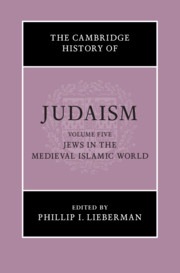Book contents
- The Cambridge History of Judaism
- The Cambridge History of Judaism
- The Cambridge History of Judaism
- Copyright page
- Contents
- Figures
- Acknowledgments
- Introduction
- Part I Jews in the Medieval Islamic World
- Part II Social and Institutional History
- Part III Spiritual and Intellectual History
- Chapter 17 Karaism
- Chapter 18 Non-Rabbinic and Non-Karaite Religious Movements
- Chapter 19 Languages and translation
- Chapter 20 Book Production
- Chapter 21 Jewish Bible Exegesis in Muslim Lands in the Middle Ages
- Chapter 22 Jewish Law
- Chapter 23 Liturgy
- Chapter 24 Piyyuṭ
- Chapter 25 Jewish Philosophy
- Chapter 26 Science and Medicine
- Chapter 27 Magic
- Chapter 28 Mysticism
- Chapter 29 Belles Lettres
- Chapter 30 Jewish-Muslim Polemics
- Chapter 31 Historiography
- Chapter 32 Material Culture, Art, and Architecture
- Index
- References
Chapter 28 - Mysticism
from Part III - Spiritual and Intellectual History
Published online by Cambridge University Press: 21 August 2021
- The Cambridge History of Judaism
- The Cambridge History of Judaism
- The Cambridge History of Judaism
- Copyright page
- Contents
- Figures
- Acknowledgments
- Introduction
- Part I Jews in the Medieval Islamic World
- Part II Social and Institutional History
- Part III Spiritual and Intellectual History
- Chapter 17 Karaism
- Chapter 18 Non-Rabbinic and Non-Karaite Religious Movements
- Chapter 19 Languages and translation
- Chapter 20 Book Production
- Chapter 21 Jewish Bible Exegesis in Muslim Lands in the Middle Ages
- Chapter 22 Jewish Law
- Chapter 23 Liturgy
- Chapter 24 Piyyuṭ
- Chapter 25 Jewish Philosophy
- Chapter 26 Science and Medicine
- Chapter 27 Magic
- Chapter 28 Mysticism
- Chapter 29 Belles Lettres
- Chapter 30 Jewish-Muslim Polemics
- Chapter 31 Historiography
- Chapter 32 Material Culture, Art, and Architecture
- Index
- References
Summary
In the thirteenth century, Judaism and Islam gave birth to two monumental works which had a lasting impact on their respective mystical systems: within Judaism and the Kabbalistic tradition it was the Zohar, the Book of Splendor, “which was destined to overshadow all other documents of Kabbalist literature by the success and the fame it achieved and the influence it gradually exerted.” According to Yehuda Liebes, who has studied the method and process of its compilation and the identity of those who participated in this process, the Zohar seems to have been compiled by “the mid-thirteenth-century circle of ‘Gnostic Kabbalists’ in Castile.” Within the Muslim mystical tradition, it was the work of the Andalusian born Ibn al-ʿArabī (d. 1240), in particular his Meccan Revelations (al-Futūḥāt al-Makkiyya), in which “he was to express in writing that vast range of esoteric knowledge, which, until his time, had been transmitted orally or by way of allusions only.” That these two thirteenth-century mystical works, which mark turning points in the history of Jewish and Islamic mystical traditions, were conceived within such temporal and spatial proximity is thought-provoking. The fact that both were compiled by mystics of Spanish origins raises the question of possible common roots. Indeed, although Kabbalah, geographically and temporally speaking, relates to post-Andalusian Jewish history, when one adds up the literary testimonies stemming from the tenth century onward, it appears that the question of Kabbalistic origins should be viewed with an Andalusian prehistory in mind. In spite of clear differences between the two – the Zohar was compiled in Aramaic in the later part of the thirteenth century within a Jewish circle from the north of Spain living under Christian rule; the Meccan Revelations was written in Arabic in the earlier part of that same century by an Andalusian Muslim (albeit after having left al-Andalus for the eastern Muslim world) – both the Zohar and the Meccan Revelations mark the culmination of an intellectual, mystically inclined process, which, for Andalusian Jews and Muslims alike, had started approximately two centuries before, that is, in the tenth century, when certain teachings were brought to al-Andalus from the East and inspired there a growing interest in the mystical dimension of the religious life.
- Type
- Chapter
- Information
- The Cambridge History of Judaism , pp. 891 - 922Publisher: Cambridge University PressPrint publication year: 2021



